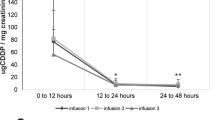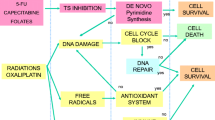Abstract
Background: Increasing evidence suggests that common gene polymorphisms may influence the toxicity of various cytotoxic agents used in the treatment of cancer.
Objective: To evaluate the predictive value of acute toxicity of methylenetetrahydrofolate reductase 677T polymorphism, glutathione S-transferase P1 (GSTP1) substitution of isoleucine with valine at codon 105 (Ile105Val) polymorphism and the tandem repeat polymorphism in the thymidylate synthase gene promoter in elderly patients with rectal cancer receiving preoperative chemoradiotherapy (CRT).
Method: From 1994 to 2002, 166 Caucasian patients underwent surgery following CRT for mid-low rectal cancer at a single institution, 42 (male-to-female ratio, 25:17) of whom were aged ≥65 years (median age 70 years, range 65–79). The pre-treatment clinical stage was tumour (T) stage 3–4 in 38 patients and node (N)-positive in 29 patients. Patients received external-beam radiotherapy with conventional fractionation and fluorouracil-based chemotherapy. Blood samples were used to extract and amplify DNA. Gene polymorphisms were determined by polymerase chain reaction and restriction enzyme digestion. Acute toxicity to preoperative therapy was reported according to the National Cancer Institute Common Toxicity Criteria, version 2. Univariate and multivariate analyses were performed using one-way analysis of variance and linear regression, respectively.
Results: Haematological toxicity (grade 1–2) was observed in 15 of 40 patients for whom toxicity data were available and gastrointestinal toxicity (grade 1–4) in 24 of these same 40 patients. At univariate analysis, female sex (p = 0.036) and GSTP1 Ile105Val (p = 0.0376) were associated with haematological toxicity. At multivariate analysis, GSTP1 Ile105Val polymorphism (p = 0.041) was the only factor found to be associated with haematological toxicity. Patients carrying the Val/Val genotype in the GSTP1 gene had a lower risk of haematological toxicity (odds ratio = 0.322, 95% CI 0.101, 0.957) than patients with the Ile/Ile genotype.
Conclusion: GSTP1 Ile105Val polymorphism is a promising marker of potential haematological toxicity in elderly patients with rectal cancer receiving preoperative CRT.





Similar content being viewed by others
References
EUCAN. Cancer incidence, mortality and prevalence in the European Union: 1998 estimates [online]. Available from URL: http://www-dep.iarc.fr/eucan/eucan.htm [Accessed 2008 Apr 1]
Grobovsky L, Kaplon M, Krozser-Hamati A, et al. Features of cancer in frail elderly patients (pts) (85 years of age) [abstract no. 2469]. Proc Am Soc Clin Oncol 2000; 19: 139
Pucciarelli S, Friso ML, Toppan P, et al. Preoperative combined radiotherapy and chemotherapy for middle and lower rectal cancer: preliminary results. Ann Surg Oncol 2000; 7(1): 38–44
The Advanced Colorectal Meta-Analysis Project. Modulation of fluorouracil with leucovorin in patients with advanced colorectal cancer: evidence in terms of response rate. J Clin Oncol 1992; 10: 896–903
O’Connell MJ, Martenson JA, Wieand HS, et al. Improving adjuvant therapy for rectal cancer by combining protracted-infusion fluorouracil with radiation therapy after curative surgery. New Engl J Med 1994; 331: 502–7
Sobrero A, Guglielmi A, Cirillo M, et al. 5-fluorouracil modulated by leucovorin, methotrexate and mitomycin: highly effective, low-cost chemotherapy for advanced colorectal cancer. Br J Cancer 2001; 84(8): 1023–8
Sargent DJ, Goldberg RM, Jacobson SD, et al. A pooled analysis of adjuvant chemotherapy for resected colon cancer in elderly patients. N Engl J Med 2001; 345(15): 1091–7
The Advanced Colorectal Cancer Meta-Analysis Project. Metaanalysis of randomized trials testing the biochemical modulation of fluorouracil by methotrexate in metastatic colorectal cancer. J Clin Oncol 1994; 12: 960–9
The Meta-Analysis Group in Cancer. Efficacy of intravenous continuous infusion of fluorouracil compared with bolus administration in advanced colorectal cancer. J Clin Oncol 1998; 16: 301–8
Raymond E, Chaney SG, Taamma A, et al. Oxaliplatin: a review of preclinical and clinical studies. Ann Oncol 1998; 9: 1053–71
Hessman O, Bergkvist L, Strom S. Colorectal cancer in patients over 75 years of age: determinants of outcome. Eur J Surg Oncol 1997; 23(1): 13–9
Koperna T, Kisser M, Schulz F. Hepatic resection in the elderly. World J Surg 1998; 22(4): 406–12
Balducci L, Yates G. General guidelines for the management of older patients with cancer. Oncology 2000; 14: 221–7
Relling MV, Dervieux T. Pharmacogenetics and cancer therapy. Nat Rev Cancer 2001; 1: 99–108
Ulrich CM, Robien K, McLeod HL. Cancer pharmacogenetics: polymorphisms, pathways and beyond. Nat Rev Cancer 2003; 3: 912–20
Nagasubramanian R, Innocenti F, Ratain MJ, et al. Pharmacogenetics in cancer treatment. Ann Rev Med 2003; 54: 437–52
Jakobsen A, Nielsen JN, Gyldenkerne N, et al. Thymidylate synthase and methylenetetrahydrofolate reductase gene polymorphism in normal tissue as predictors of fluorouracil sensitivity. J Clin Oncol 2005; 23: 1365–9
Chiusolo P, Reddiconto G, Casorelli I, et al. Preponderance of methylenetetrahydrofolate reductase C677T homozygosity among leukemia patients intolerant to methotrexate. Ann Oncol 2002; 13(12): 1915–8
Stoehlmacher J, Park DJ, Zhang W, et al. Association between glutathione S-transferase P1, T1, and M1 genetic polymorphism and survival of patients with metastatic colorectal cancer. J Natl Cancer Inst 2002; 94: 936–42
Edvardsen H, Kristensen VN, Grenaker Alnaes GI, et al. Germline glutathione S-transferase variants in breast cancer: relation to diagnosis and cutaneous long-term adverse effects after two fractionation patterns of radiotherapy. Int J Radiat Oncol Biol Phys 2007; 67(4): 1163–71
Trotti A, Byhardt R, Stetz J, et al. Common toxicity criteria: version 2.0. An improved reference for grading the acute effects of cancer treatment: impact on RT. Int J Radiat Oncol Biol Phys 2000; 47: 13–47
Van Triest B, Peters GJ. Thymidylate synthase: a target for combination therapy and determinant of chemotherapeutic response in colorectal cancer. Oncology 1999; 57: 179–94
Agostini M, Pucciarelli S, Calandra P, et al. Genetic heterogeneity of variable number tandem repeats in thymidylate synthase gene in colorectal cancer patients. Int J Biol Markers 2004; 19(4): 332–6
Terrazzino S, Agostini M, Pucciarelli S, et al. A haplotype of the methylenetetrahydrofolate reductase gene predicts poor tumor response in rectal cancer patients receiving preoperative chemoradiation. Pharmacogenet Genomics 2006; 16(11): 817–24
Harries LW, Stubbins MJ, Forman D, et al. Identification of genetic polymorphisms at the glutathione S-transferase P1 locus and association with susceptibility to bladder, testicular and prostate cancer. Carcinogenesis 1997; 18: 641–4
Pullarkat ST, Stoehlmacher J, Ghaderi V, et al. Thymidylate synthase gene polymorphism determines response and toxicity of 5FU chemotherapy. Pharmacogenomics J 2001; 1(1): 65–70
Cohen V, Panet-Raymond V, Sabbaghian N, et al. Methylenetetrahydrofolate reductase polymorphism in advanced colorectal cancer: a novel genomic predictor of clinical response to fluoropyrimidine-based chemotherapy. Clin Cancer Res 2003; 9: 1611–5
Mannervik B, Alin P, Guthenberg C, et al. Identification of three classes of cytosolic glutathione transferase common to several mammalian species: correlation between structural data and enzymatic properties. Proc Natl Acad Sci U S A 1985; 82: 7202–6
Moscow JA, Fairchild CR, Madden MJ, et al. Expression of anionic glutathione-S-transferase and P-glycoprotein genes in human tissues and tumors. Cancer Res 1989; 49: 1422–8
Ban N, Takahashi Y, Takayama T, et al. Transfection of glutathione S-transferase (GST)-P1 antisense complementary DNA increases the sensitivity of a colon cancer cell line to adriamycin, cisplatin, melphalan, and etoposide. Cancer Res 1996; 56: 3577–82
O’Brien M, Kruh GD, Tew KD. The influence of coordinate overexpression of glutathione phase II detoxification gene products on drug resistance. J Pharmacol Exp Ther 2000; 294: 480–7
Tsuchida S, Sato K. Glutathione transferases and cancer. Crit Rev Biochem Mol Biol 1992; 27: 337–84
Watson MA, Stewart RK, Smith GB, et al. Human glutathione S-transferase P1 polymorphisms: relationship to lung tissue enzyme activity and population frequency distribution. Carcinogenesis 1998; 19: 275–80
Srivastava SK, Singhal SS, Hu X, et al. Differential catalytic efficiency of allelic variants of human glutathione S-transferase P1 in catalyzing the glutathione conjugation of thiotepa. Arch Biochem Biophys 1999; 366: 89–94
Sweeney C, McClure GY, Fares MY, et al. Association between survival after treatment for breast cancer and glutathione S-transferase P1 Ile105Val polymorphism. Cancer Res 2000; 60: 5621–4
Mandola MV, Stoehlmacher J, Muller-Weeks S, et al. A novel single nucleotide polymorphism within the 50 tandem repeat polymorphism of the thymidylate synthase gene abolishes USF-1 binding and alters transcriptional activity. Cancer Res 2003; 63(11): 2898–904
Dotor E, Cuatrecases M, Martinez-Iniesta M. Tumor thymidylate synthase 1494del6 genotype as a prognostic factor in colorectal cancer patients receiving fluorouracil-based adjuvant treatment. J Clin Oncol 2006; 24(10): 1603–11
Toffoli G, Russo A, Innocenti F, et al. Effect of methylenetetrahydrofolate reductase 677C—>T polymorphism on toxicity and homocysteine plasma level after chronic methotrexate treatment of ovarian cancer patients. Int J Cancer 2003; 103: 294–9
Pasetto LM, Friso ML, Pucciarelli S, et al. Rectal cancer neoadjuvant treatment in elderly patients. Anticancer Res 2006; 26: 3913–24
Acknowledgements
This study, conducted in Padova (Italy), was partially supported by grants from the Italian Ministry of Health (Programma speciale ex. art.12, 2004), AIRC (Associazione Italiana Ricerca Cancro). The authors have no conflicts of interest that are directly relevant to the content of this study. The authors are grateful to Miss Marta Briarava for collecting and managing clinical and research data, and to Antonette Leon for her assistance with the English language.
Author information
Authors and Affiliations
Corresponding author
Rights and permissions
About this article
Cite this article
Agostini, M., Pasetto, L.M., Pucciarelli, S. et al. Glutathione S-Transferase P1 Ile105Val Polymorphism is Associated with Haematological Toxicity in Elderly Rectal Cancer Patients Receiving Preoperative Chemoradiotherapy. Drugs Aging 25, 531–539 (2008). https://doi.org/10.2165/00002512-200825060-00006
Published:
Issue Date:
DOI: https://doi.org/10.2165/00002512-200825060-00006




